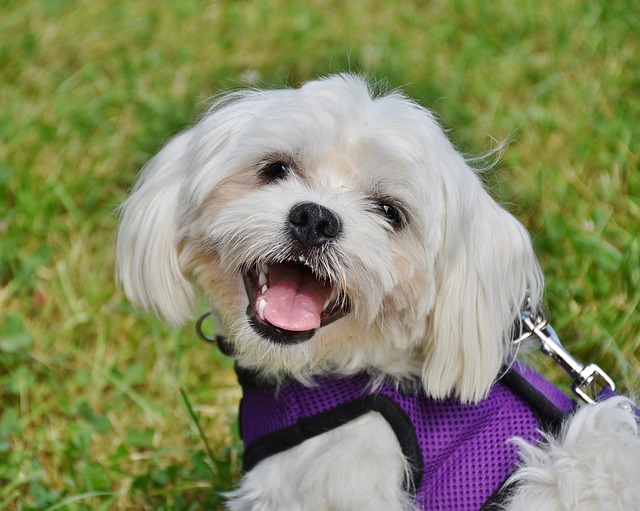Anyone would be delighted to have a Maltese puppy in their home since they are such cute little creatures. Maltese training is enjoyable and simple with these cute puppies since they pick things very quickly. But as seasoned dog owners and trainers are aware, every type of dog breed is different, and these canines require particular care during training. We will talk about some helpful advice for properly training your Maltese puppy in this article.
- See to it that you begin early training: Even though they are naturally playful and inquisitive, Maltese puppies can sometimes be stubborn. Your Maltese puppy will be more acclimated to your house and find learning simpler if you begin early training, which includes socialization, potty training, crate training, and basic obedience training. Commencing early will help stop negative behaviors from forming as a result of unclear guidance.
- Make sure that you use positive reinforcement: During training, one of the greatest ways to make your Maltese feel loved and valued is to give them positive reinforcement, like treats and praise. It takes perseverance and patience to train a Maltese puppy. Physical punishment should be avoided as it might engender fear and a lack of trust. Instead, reward positive conduct with praise and treats.
- See to it that you keep training sessions short but consistent: Training sessions that are short but consistent are superior to those that are lengthy and sporadic. Puppies of the Maltese breed often have short attention spans and can easily get bored or disinterested. Divide the sessions into manageable chunks of 15 to 20 minutes each, and do so multiple times a day. Training that is effective and long-lasting requires consistency, so don’t ever give up on your Maltese puppy; instead, give it your all.
- Take puppy classes or work with a professional trainer: When you enroll in a puppy class, it can be beneficial for both you and your Maltese pup. In a puppy class, you will not only be able to work with experienced trainers but will also allow your Maltese to socialize with other pups and practice their socialization skills. A professional trainer can offer insight and guidance that will help your Maltese pup learn new things quickly.
- Make training your Maltese fun: Make training enjoyable by including play and avoiding making it seem like work so this will lead you and your Maltese puppy to find the training entertaining and pleasurable if you use toys and other engaging activities.
Maltese puppy training may be enjoyable and fulfilling you just do not have to forget to start early, apply positive reinforcement, shorten yet regularize training sessions, enlist in puppy classes or seek professional assistance, and make their training enjoyable. Your Maltese puppy can grow up to be the obedient, well-mannered pet you’ve always desired if you give it enough time, patience, and positive reinforcement.

Training Your Dog the Right Way – The Benefits of Proper Dog Training for Your Maltese
Dogs are known as man’s best friend for a reason some of which is that they are loving, loyal, and endlessly entertaining. But dog owners know that owning a pet comes with certain responsibilities and one of the most important is training. Dogs, like your new Maltese pup, will need proper training, not just to behave well, but for their overall mental and physical well-being. Below will be a discussion on the benefits of proper dog training and explore some of the ways you can achieve success in training your new Maltese puppy.
- Establishing Clear Communication
Dog training is a two-way process because both you and your dog must communicate with one another. Communicating with a well-trained dog is considerably easier since they will obey your directions and listen to you. You can teach your dog basic instructions like sit, stay, and come through obedience training. It goes beyond that, though. A happier, healthier relationship between you and your dog can be achieved through training, which helps set clear expectations and boundaries.
- Improving Mental and Physical Health
In addition to mental fortification, training can enhance your dog’s physical well-being. For dogs to be healthy, content, and active, they require mental stimulation, and this mental stimulation can be obtained by training. Additionally, obedience training teaches your dog acceptable manners like avoiding jumping on people or yanking on the leash. This can lower the chance of injury and greatly facilitate regular walks and exercise.
- Reducing Stress and Anxiety
When a dog is not trained correctly, stress and anxiety levels might rise. They might chew on furniture, bark a lot, or exhibit other destructive tendencies. But you can make your dog feel more at ease and self-assured by providing them with regular training and positive reinforcement. Your dog may behave better as a result of having a safe and contented environment.
- Strengthening the Bond Between You and Your Dog
Building a stronger relationship with your dog can also be achieved through training him. In addition to fostering trust and better communication, it provides an opportunity to spend quality time together with your pup. Due to their sociable nature, dogs like the Maltese cherish the time spent with their human friends, so creating an enjoyable and captivating training experience, will help your dog form a favorable mental link with you.
- Creating a Safe and Happy Home
In the end, having a well-trained dog makes your home a happier and healthier place for you and your pet. Dogs thrive on regularity, routine, and structure. You can give your dog a secure and comfortable environment by setting clear expectations and boundaries. Everyone’s daily life can be greatly facilitated by doing this and chaos can be eliminated.
To sum up, instilling proper dog training is essential for your pet’s health, happiness, and welfare. Clear communication, better physical and mental health, less stress and worry, a stronger link with your dog, and a secure and contented home can all be achieved via training. Thus, you should not hesitate to start training your dog as early as possible and you will achieve a lifetime of love and companionship with the right amount of persistence, patience, and positive reinforcement.


Leave a Reply